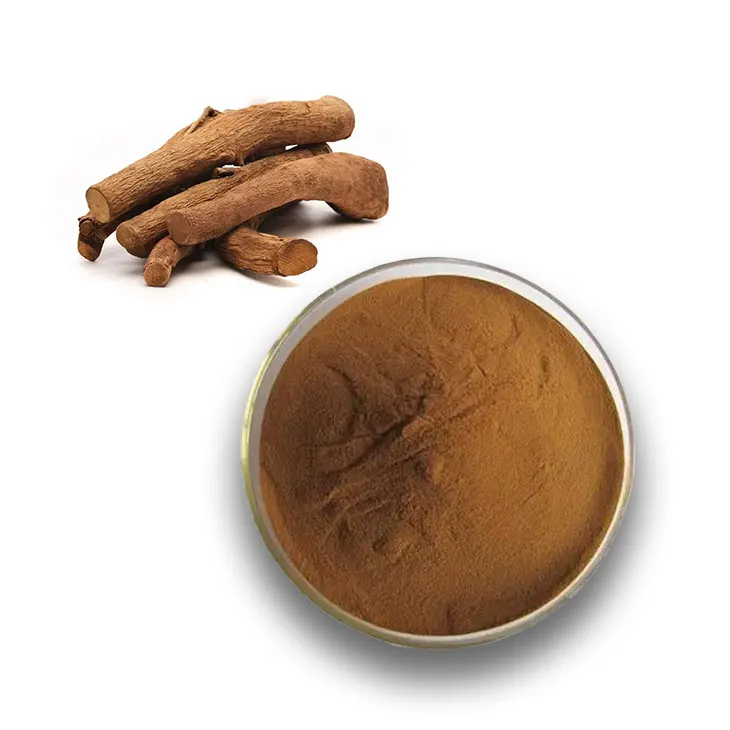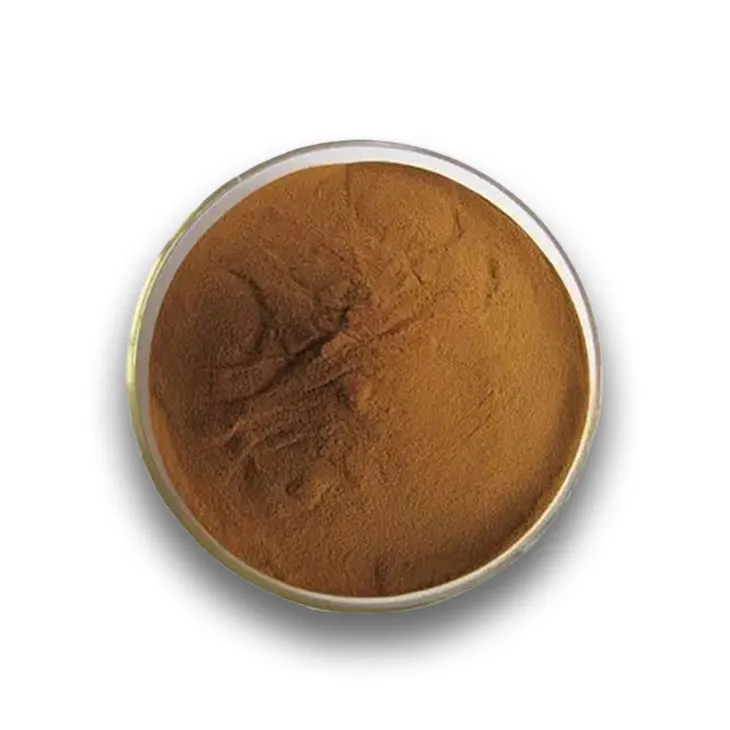- 0086-571-85302990
- sales@greenskybio.com
Tongkat Ali extract: Is the extract effective for weight loss?
2024-11-12

1. Introduction
In the pursuit of effective weight loss solutions, many individuals are constantly exploring various natural supplements. Tongkat Ali Extract, derived from the Eurycoma longifolia plant, has emerged as a potential candidate in this regard. This extract has been traditionally used in Southeast Asian medicine for a variety of health purposes. However, its effectiveness for weight loss remains a subject of much research and debate. This article aims to comprehensively examine whether Tongkat Ali Extract can play a role in the weight - loss journey by looking at relevant studies, its impact on body composition, appetite, and energy expenditure.

2. Overview of Tongkat Ali
Tongkat Ali, also known as Eurycoma longifolia, is a small evergreen tree native to Southeast Asia, particularly Malaysia, Indonesia, and Thailand. For centuries, it has been used in traditional medicine systems in these regions. The root of the Tongkat Ali plant is the main part used for extraction, and it contains a variety of bioactive compounds such as alkaloids, quassinoids, and glycosides. These compounds are believed to be responsible for the plant's potential medicinal properties.

3. Studies on Tongkat Ali and Weight Loss
3.1 Animal Studies
Several animal studies have been conducted to explore the relationship between Tongkat Ali Extract and weight loss. In some rodent studies, it has been observed that the extract may have an impact on body weight. For example, in a study on obese rats, those given Tongkat Ali extract showed a significant reduction in body weight compared to the control group over a certain period. This reduction was accompanied by changes in body composition, including a decrease in body fat percentage. The possible mechanisms behind this could be related to its effects on metabolism. The extract may enhance the activity of certain enzymes involved in fat metabolism, such as lipase, which helps break down fats.
3.2 Human Studies
When it comes to human studies, the evidence is more complex. Some small - scale clinical trials have been carried out. In one study involving overweight individuals, participants who took Tongkat Ali extract along with a controlled diet and exercise program showed a tendency towards greater weight loss compared to those who only followed the diet and exercise regime without the extract. However, the differences were not always statistically significant. Another study focused on male subjects with a sedentary lifestyle. After a few weeks of taking Tongkat Ali extract, there was a slight decrease in body mass index (BMI) in some of the participants, but again, the results were not conclusive across the board. One of the challenges in human studies is the variability in individual responses, which can be influenced by factors such as diet, baseline health status, and genetic factors.

4. Effects on Body Composition
4.1 Fat Loss
One of the key aspects of weight loss is fat loss, and Tongkat Ali extract may have some potential in this area. As mentioned in the animal studies, it could influence fat metabolism. In humans, some anecdotal evidence suggests that regular consumption of Tongkat Ali extract may lead to a reduction in abdominal fat, which is often a stubborn area for many people trying to lose weight. However, more rigorous scientific studies are needed to confirm this. If Tongkat Ali extract can indeed promote fat loss, it may be due to its ability to increase the body's thermogenesis. Thermogenesis is the process by which the body generates heat, and an increase in this process can lead to more calories being burned, especially from fat stores.
4.2 Muscle Preservation
During weight loss, it is important to preserve muscle mass. Some research indicates that Tongkat Ali extract may have a role in this. It is thought to help maintain muscle protein synthesis, which is crucial for muscle preservation. This is especially relevant when individuals are on a calorie - restricted diet, as they are at risk of losing muscle along with fat. By promoting muscle preservation, Tongkat Ali extract could potentially improve body composition during the weight - loss process. However, more research is required to fully understand the mechanisms and the extent of its impact on muscle preservation in the context of weight loss.
5. Impact on Appetite
Appetite regulation is a crucial factor in weight loss. There are some indications that Tongkat Ali extract may affect appetite. Some users report a decrease in appetite after taking the extract. This could potentially be due to its influence on certain hormones in the body that are involved in appetite control, such as leptin and ghrelin. Leptin is a hormone that signals satiety, and ghrelin is known as the "hunger hormone." If Tongkat Ali extract can modulate the levels of these hormones in a favorable way, it could help individuals consume fewer calories, which is essential for weight loss. However, the exact mechanisms by which it affects these hormones are not yet fully understood, and more research is needed to establish a clear link between Tongkat Ali extract and appetite regulation.
6. Effects on Energy Expenditure
Increasing energy expenditure is another way to promote weight loss. Tongkat Ali extract may have an impact on energy expenditure. It could potentially enhance the body's basal metabolic rate (BMR), which is the amount of energy the body needs to function at rest. A higher BMR means that the body burns more calories even when not engaged in physical activity. Some studies suggest that the bioactive compounds in Tongkat Ali extract may interact with the body's mitochondria, the powerhouses of the cells, to increase energy production and thus potentially boost BMR. However, the evidence for this is still preliminary, and further research is necessary to determine the magnitude of its effect on energy expenditure and whether it can be a significant contributor to weight loss.
7. Safety Considerations
While exploring the potential of Tongkat Ali extract for weight loss, it is also important to consider its safety. In general, when taken in appropriate doses, Tongkat Ali extract is considered relatively safe for most people. However, some individuals may experience side effects. These can include insomnia, restlessness, and increased blood pressure in some cases. Pregnant and breastfeeding women should avoid using Tongkat Ali extract, as there is not enough research to determine its safety during pregnancy and lactation. Also, people with certain medical conditions, such as heart problems or hormonal imbalances, should consult their healthcare providers before using the extract.
8. Conclusion
In conclusion, the evidence regarding the effectiveness of Tongkat Ali extract for weight loss is currently inconclusive. While there are some promising findings from animal studies and some suggestive results from human trials, more high - quality research is needed. The extract may have potential effects on body composition, appetite, and energy expenditure, but these effects need to be further investigated and quantified. Additionally, safety considerations should always be taken into account. Until more definitive evidence is available, Tongkat Ali extract cannot be considered a reliable and standalone solution for weight loss. However, it may potentially be used as part of a comprehensive weight - loss plan that includes a healthy diet and regular exercise.
FAQ:
What is Tongkat Ali extract?
Tongkat Ali extract comes from the Eurycoma longifolia plant. It has been used in traditional medicine in Southeast Asia for various purposes, including potential health benefits related to male virility, energy enhancement, and more recently, its possible role in weight management.
How might Tongkat Ali extract affect body composition?
Some studies suggest that Tongkat Ali extract may influence body composition. It could potentially increase muscle mass. This might be due to its effects on testosterone levels in men. Testosterone can play a role in muscle growth and development. However, the evidence regarding its direct impact on body fat reduction is less conclusive. More research is needed to fully understand how it specifically alters the ratio of muscle to fat in the body.
Does Tongkat Ali extract affect appetite?
There is currently limited evidence regarding the direct effect of Tongkat Ali extract on appetite. Some people claim that it may help suppress appetite, but there are no large - scale, well - controlled studies to firmly establish this. It's possible that any reported effects on appetite could be secondary to other changes in the body, such as hormonal alterations or increased energy expenditure.
Can Tongkat Ali extract increase energy expenditure?
There are some indications that Tongkat Ali extract might increase energy expenditure. It could potentially boost metabolism, perhaps through interactions with certain hormones or enzymes in the body. However, the magnitude of this effect and its long - term sustainability are not well - defined. Small - scale studies have shown some promising results, but larger and more comprehensive research is required to determine its true impact on energy expenditure.
Are there any side effects of using Tongkat Ali extract for weight loss?
Like any supplement, Tongkat Ali extract may have potential side effects. Some users have reported minor side effects such as insomnia, restlessness, or increased heart rate, especially at higher doses. Also, it may interact with certain medications, so it's important to consult a healthcare provider before using it for weight loss or any other purpose. Pregnant or breastfeeding women should avoid using Tongkat Ali extract as its safety in these situations has not been established.
Related literature
- The Effects of Eurycoma longifolia Jack on Testosterone and Body Composition in Males"
- "Eurycoma longifolia: A Review of its Phytochemistry, Pharmacology, and Traditional Uses"
- "Potential Role of Tongkat Ali (Eurycoma longifolia) in Energy Metabolism and Weight Management"
- ▶ Hesperidin
- ▶ Citrus Bioflavonoids
- ▶ Plant Extract
- ▶ lycopene
- ▶ Diosmin
- ▶ Grape seed extract
- ▶ Sea buckthorn Juice Powder
- ▶ Fruit Juice Powder
- ▶ Hops Extract
- ▶ Artichoke Extract
- ▶ Mushroom extract
- ▶ Astaxanthin
- ▶ Green Tea Extract
- ▶ Curcumin
- ▶ Horse Chestnut Extract
- ▶ Other Product
- ▶ Boswellia Serrata Extract
- ▶ Resveratrol
- ▶ Marigold Extract
- ▶ Grape Leaf Extract
- ▶ New Product
- ▶ Aminolevulinic acid
- ▶ Cranberry Extract
- ▶ Red Yeast Rice
- ▶ Red Wine Extract
-
Red Date Extract
2024-11-12
-
Shikone Extract
2024-11-12
-
Motherwort Extract
2024-11-12
-
Plantain extract
2024-11-12
-
Tormentil Extract
2024-11-12
-
Rosemary extract
2024-11-12
-
Centella Asiatica Extract
2024-11-12
-
Beta Carotene
2024-11-12
-
Nettle Root Extract
2024-11-12
-
Baicalin
2024-11-12





















